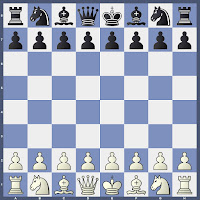Norway Open: Round 1 - Giri fails to draw!!
"I am the interval between what I am and What I am not...." - Fernando Pessoa
In order to understand a game of Chess.....even Tennis, Golf, Snooker....or any such game....why even Cricket - if you consider a Batsman or Bowler in isolation.....in order to understand the choices that are being made.....
......you need to indwell in the mind of the player....or even best, talk to him on his choices....
.....even though, they may not well articulate their inner thoughts.....the wordless, shapeless, featureless abyss within...., that is the closest one can get!
Everything else, the live commentary, the written commentary.....and this crap....is all approximation....guesswork.....
"White's first "merely good" move. "Best" by unanimous consent is 3.N-Qb3".....wrote David Bronstein in Zurich 1953.
To the question, "Is the first move really an advantage?" Bronstein wrote, "The opening advantage here is considered to be the right of the player who has White to choose the system of development that best suits his taste, giving his individual creative ability its fullest scope. Therefore, the opening strategy does not mean that one necessarily makes the "best moves", but "merely good ones"
We shall leave what followed after this to the theoreticians to break their head and computers.....and reach the position after 11.....Nc6
The most important phase in a game of Chess is the transition between the opening and middlegame: the phase where both sides redeploy their forces and start targeting few things; occupying few pivotal squares, posts; aim for inflicting certain weakness in the opponent's position and avoid creating weakness in their structure etc.
The nebulous dimension "space" enters in this phase and a side strives to gain more space so as to let his pieces move freely.....get more freedom for manifestation.
A master doesn't indulge in move to move calculation, but starts visioning the greater picture....listens to his pieces and tries to put them where they love to. Most importantly, he takes ultimate care to push his pawns and more so when to exchange the pawns or let the opponent exchange his pawns.
For, without pawns, Chess turns into a barren dessert!
12.Be3!
The next "merely good" move!
12.....Rfc8
Meets the threat of Bc5
13.Rfd1
This is just a taste, possible was also putting a Rook on c1 to renew the threat on c5 pawn!
13......d5; 14.cd5 ed5; 15.Bc5 Qa5; 16.Qc2
The next pitstop! The position gets shaped from now on. There is no wrong or right plan or sequence of moves.....but, it is more about how one feels!
Chess is a very resilient game....but, of course it has threshold points!
16......Be2; 17.Qe2 Qc5; 18.Rac1 Qb6
When embarking on this variation, Hari must have had a glimpse of a position similar to the one that we have now, and must have felt that it would hold on.
Perhaps, the position is still in equilibrium....which....
19.b4 h6?!
....this move disturbs a bit.....and we know this on hindsight!
In the middlegame, the result of one's opening strategy is felt.....control of files, squares etc are pivotal which provide freedom of movement for one's pieces and deprive freedom of movement to opponent's pieces.
It is easy to comment sitting in the commentary hall or writing about it later; but things look differently when one is sitting in front of the board and playing it!
Bronstein said, "there were and are no infallible chess players, and this applies both to over-the-board play and to analytical homework..."
Yes, it is a common knowledge that Chess has thrived two or three centuries precisely on this ability of human mind to commit mistakes....but, what does Bronstein imply by saying, "....and to analytical homework..."?
Poor Bronstein.....he was oblivious to the super power that is bestowed on every chess player, these days, by the monster called engine....yet
.....what Bronstein said holds true, despite this.....for the engine is not god and assuming it is god, human mind has limitation in understanding what the god says, and hence will commit mistake...., in spite of god!
20.Qe3 Qb7
One would be tempted to count this as an error, rather than .....h6. Perhaps, rightly so, as the exchange of Queens now may have saved all his troubles later! Perhaps, after the exchange of Queens, Black may have been few moves away from restoring total parity....perhaps, it may be a principled decision to swap Queens now and hop into an endgame which may be defensible.....
....perhaps.....perhaps....
21.Bh3!
This move by Carlsen, underlines the first worry point for Black....a first indication that something has not gone well in the immediate past. It scatters the Black pieces in a hurry!
21.....Re8; 22.Qc3 Ne7
Now we see why, Black has allowed White to dominate the c-file and gain firm control of the vital central squares, which White pieces occupy and expand the control further into Black's territory.
23.Nd4! Ne4; 24.Qc7 Qa6
Perhaps, Hari would now be cursing him for not exchanging this Queen on e3!
25.f3 Ng5; 26.Bd7 Rd8; 27.h4 Nf3?
This loses immediately. Black's position is already very bad and even Harikrishna who is known for dogged defence, gives up fight....
Maybe, he could have improved on his play and choice of moves in the preceding phase, even after 21.Bh3...perhaps he could have fought harder and stronger....
Probably, he should have taken the Knight back to f6 square instead of g5.
28.Nf3 Qa3; 29.Kg2 Qb2; 30.Rd2 Qb4; 31.Re1 a5; 32.Rde2 Ng6; 33.h5 Nh8; 34.Bf5 a4; 35.Ne5 Qd6; 36.Qc2 Re8; 37.Bh7 Kf8; 38.Qf5 Re7; 39.Bg6 Kg8; 40.Nf7 Rf7; 41.Bf7 Resigned
....and a word about the title for this article.....is there a norm that 'the title' and what is being written should have some relevance!?
If yes, let me break that norm....tradition....!




.jpg)
.jpg)

Comments
Post a Comment